模块1 Unit 1 School life Grammar and usage(21)课件 (36张PPT)
文档属性
| 名称 | 模块1 Unit 1 School life Grammar and usage(21)课件 (36张PPT) | 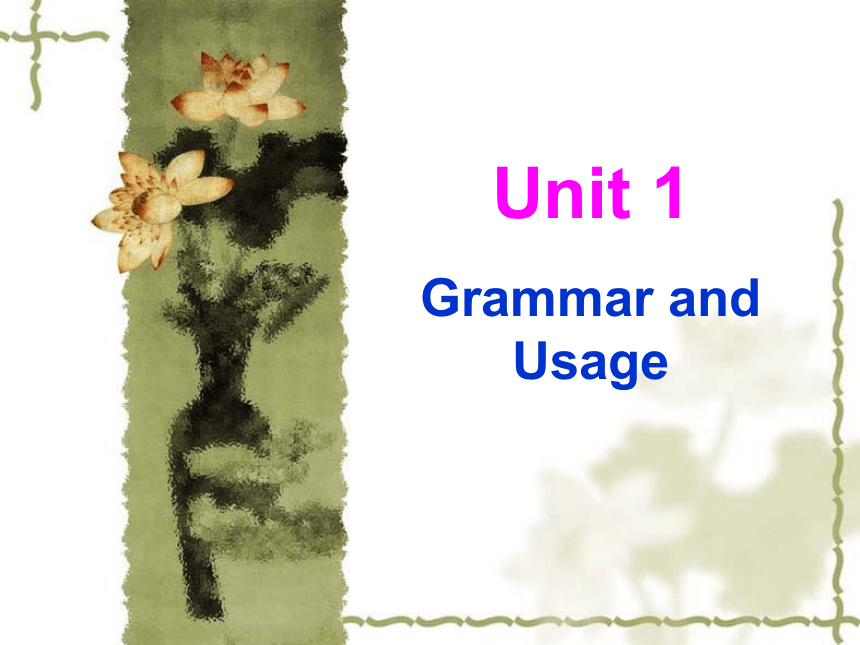 | |
| 格式 | zip | ||
| 文件大小 | 182.7KB | ||
| 资源类型 | 教案 | ||
| 版本资源 | 牛津译林版 | ||
| 科目 | 英语 | ||
| 更新时间 | 2020-01-08 19:25:46 | ||
图片预览

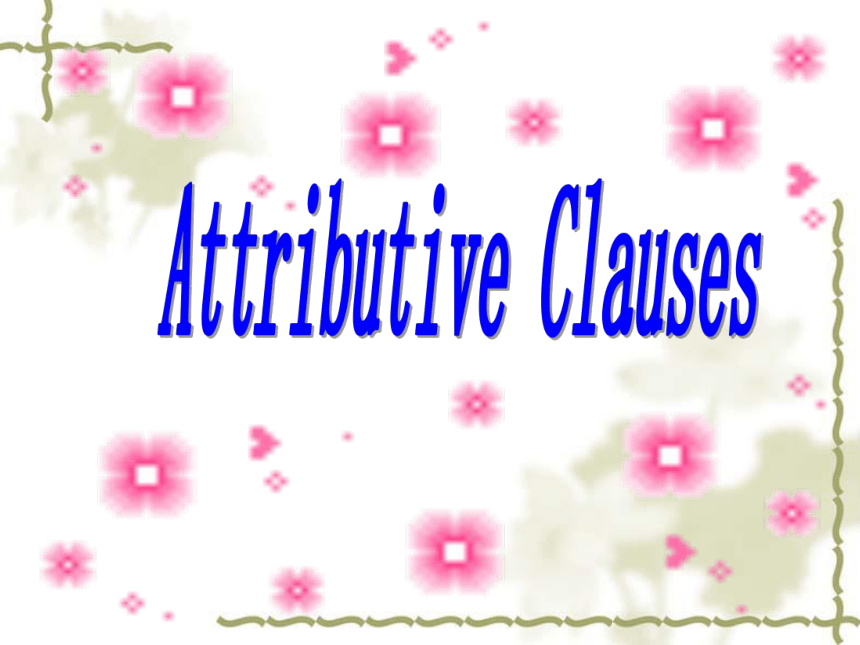

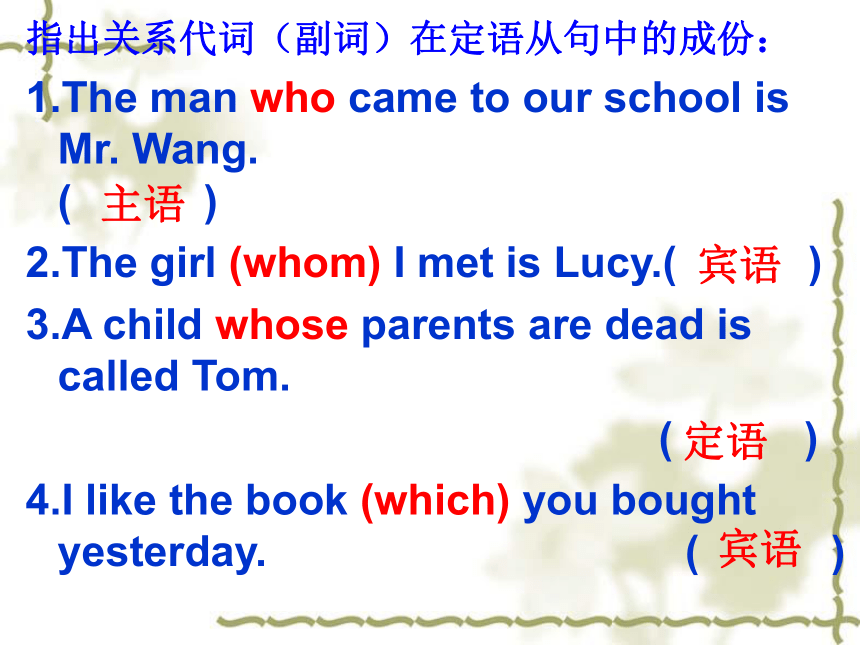

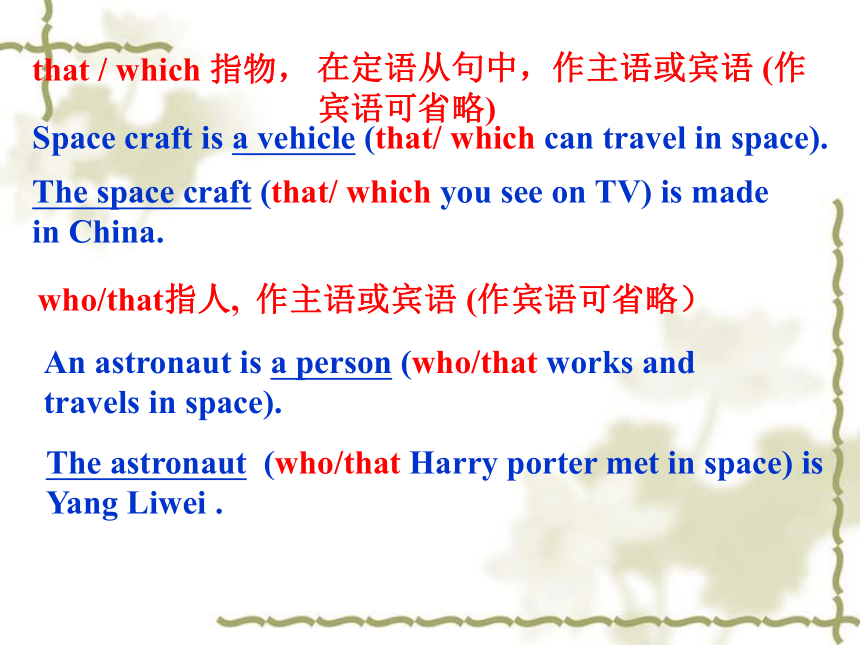
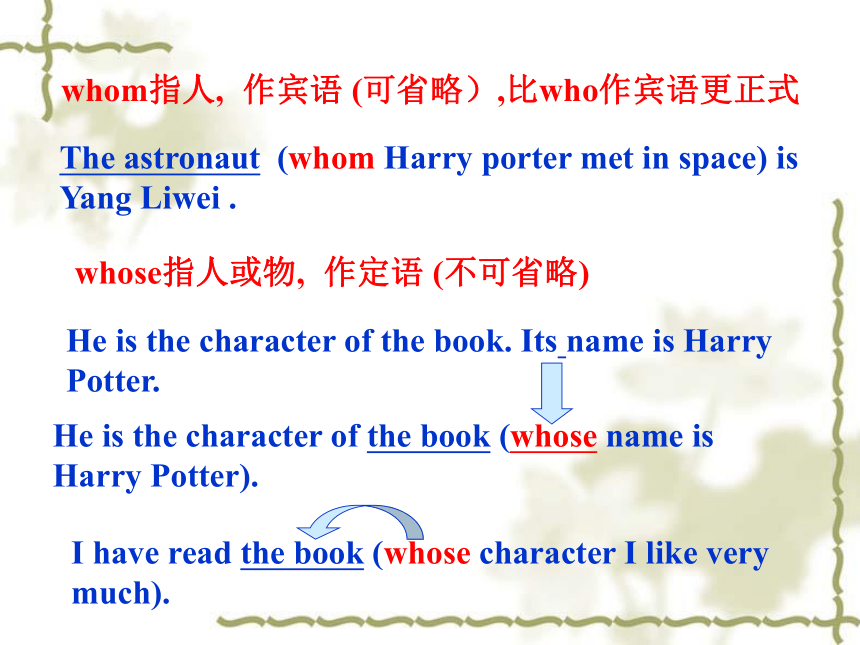
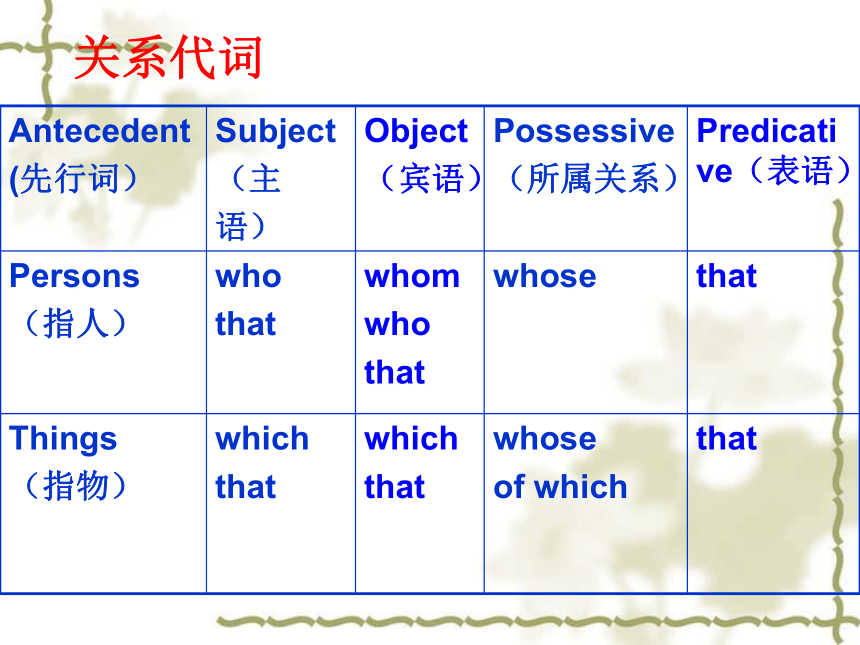

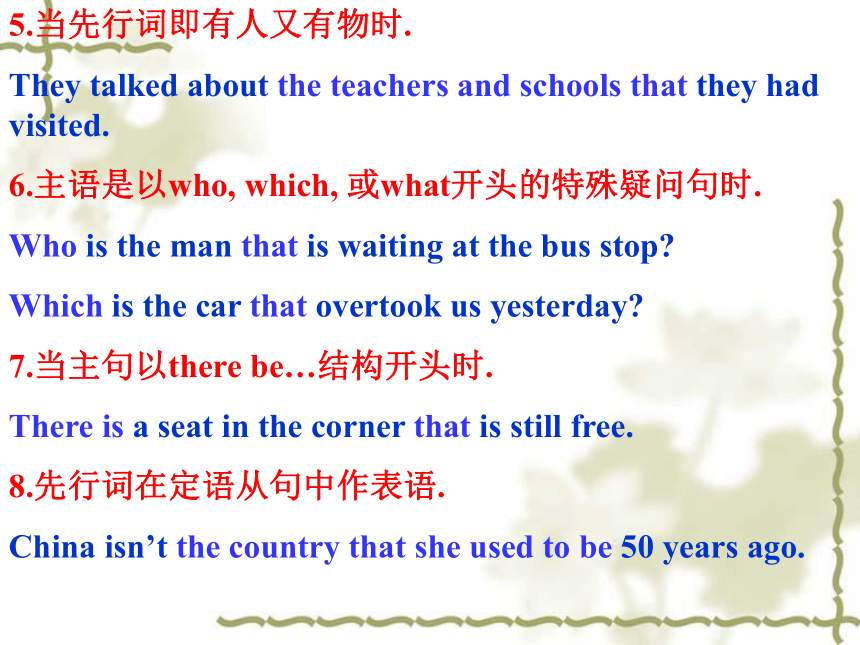
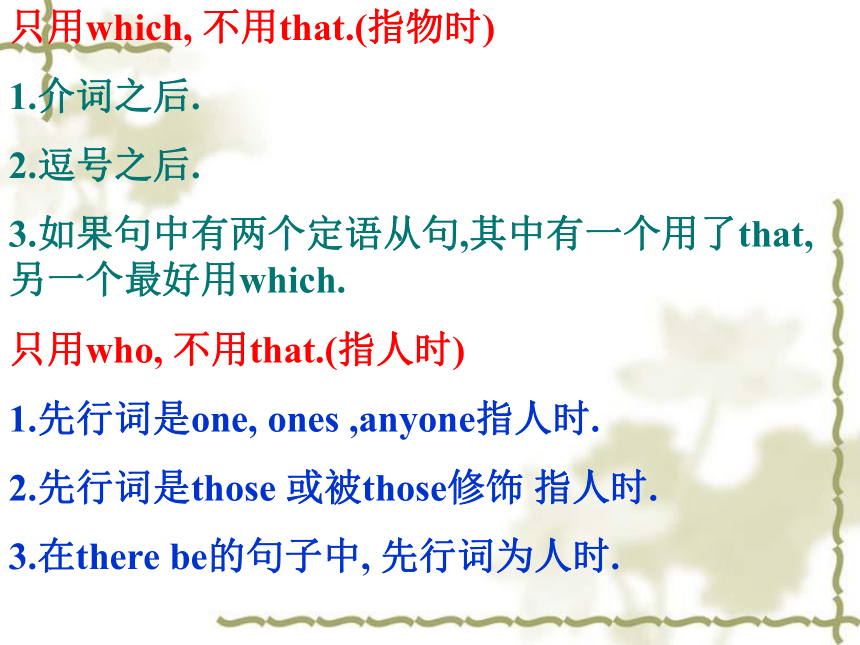
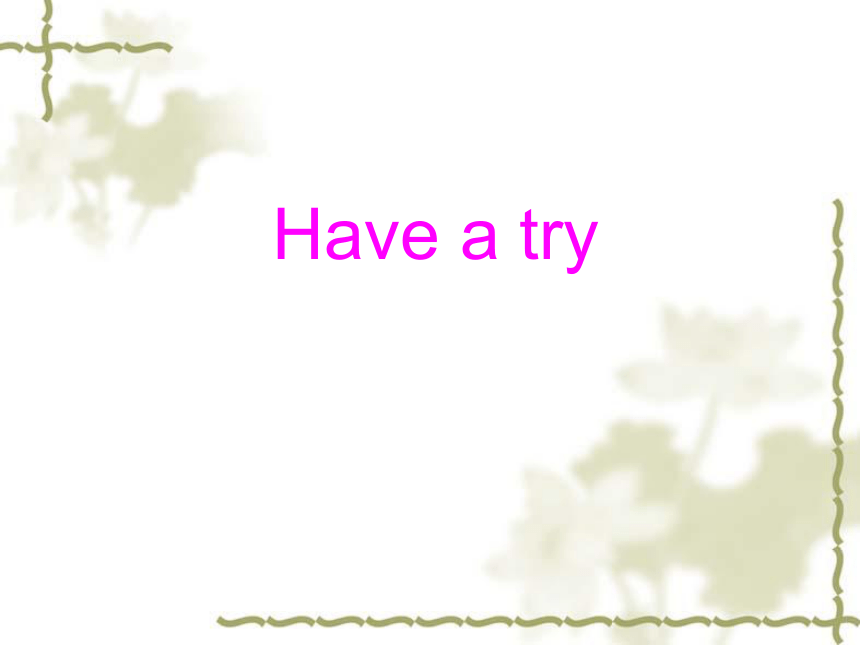
文档简介
课件36张PPT。Unit 1Grammar and Usage Attributive ClausesTeaching aims
Get students to go on learning what attributive clause is .
Try to master the functions of relative pronouns used to introduce attributive clauses.指出关系代词(副词)在定语从句中的成份:
1.The man who came to our school is Mr. Wang. ( )
2.The girl (whom) I met is Lucy.( )
3.A child whose parents are dead is called Tom.
( )
4.I like the book (which) you bought yesterday. ( )
主语宾语定语宾语Have a try5. His parents wouldn’t let him marry anyone whose family was poor.
( )
6. I like the person to whom you just talked.
( )
7. We shall never forget the days (that) we spent together. ( )
( )
8. We shall never the days when we lived together. ( )
( )定语介宾宾语that / which 指物,在定语从句中,作主语或宾语 (作宾语可省略)Space craft is a vehicle (that/ which can travel in space).The space craft (that/ which you see on TV) is made in China. who/that指人,作主语或宾语 (作宾语可省略)An astronaut is a person (who/that works and travels in space).The astronaut (who/that Harry porter met in space) is Yang Liwei . whom指人,作宾语 (可省略),比who作宾语更正式The astronaut (whom Harry porter met in space) is Yang Liwei . whose指人或物,作定语 (不可省略)He is the character of the book. Its name is Harry Potter.He is the character of the book (whose name is Harry Potter).I have read the book (whose character I like very much).关系代词I am sure she has nothing that you can borrow.I’ve read every book that is borrowed from the library. This is the first book that he has read.
This is the most interesting book that I have ever read.This is the very book that belongs to him.(1) 先行词为all, everything, nothing, anything, little,
much 等不定代词时。(2)先行词被all, every, no, some, any, little, much等修饰时。(3)先行词被序数词或形容词最高级修饰时。(4)先行词被the only, the very修饰时。I’ve read all the books that are about this matter. 只用that, 不用which.(指物时)5.当先行词即有人又有物时.
They talked about the teachers and schools that they had visited.
6.主语是以who, which, 或what开头的特殊疑问句时.
Who is the man that is waiting at the bus stop?
Which is the car that overtook us yesterday?
7.当主句以there be…结构开头时.
There is a seat in the corner that is still free.
8.先行词在定语从句中作表语.
China isn’t the country that she used to be 50 years ago.只用who, 不用that.(指人时)
1.先行词是one, ones ,anyone指人时.
2.先行词是those 或被those修饰 指人时.
3.在there be的句子中, 先行词为人时.只用which, 不用that.(指物时)
1.介词之后.
2.逗号之后.
3.如果句中有两个定语从句,其中有一个用了that,另一个最好用which.
Have a try1. All ________can be done has been done.
2.
3. This is the first letter _________I’ve written in Japanese.
4.
5. We study in the classroom of _______the doors face south.Fill the blanks with which, that, who,whosethatOne ________does not work hard will never
succeed.
He is looking for the little child___________
parents have gone to London.
whothatwhosewhich
6. What’s that __________flashed in the sky just now?
7.
8. Anyone ________breaks the law should be punished.
9.
10. Those _________learn not only from books but also through practice will succeed.There’s no difficulty ________we can’t
overcome.He lives in a house the window
of ________ faces southwhichthatwhowhichwho11. There is a girl outside _________wants to see you.
12.
13. He lives in a house _________windows face south.
14.
15. He lives in a house of __________the windows face south.What did you hear ______made you so angry?
She is the only one of the students _________
has been to the USA.
whothatwhosewho
whichCorrect the sentences1. I’m using the pen which he bought it yesterday.
2. July 1,1999 is the day when we’ll never forget.
__(去掉)which____3. I’m going to work in the hospital where needs me.
4. Those haven’t been to the West Lake will gather at the school gate.____which/thatwho^5. Soon they came to a farm house, and in front of which sat a small boy.
Or: Soon they came to a farm house, and in front of which sat a small boy.
____ it____\6. It is the one of the best films that have been shown recently.
7. The third place which we are going to visit is Hangzhou.
8. The students and things which you spoke of are known to us.
that____hasthat________whose____ am___9. The student his book I had borrowed didn’t come to school today.
10. I, who is your friend, show respect to everyone.The End Practice:
Combine the two into one, using attributive clauses.
1.My classmates enjoyed the cake.
I made the cake.
My classmates enjoyed the cake that
/which I made.
2. The club was just outside Manchester.
I joined the club two years ago.
The club ( that/which )I joined two years ago was just outside Manchester.3. We have a car park for both our visitors and our students . They drive .
We have a car park for both our visitors and our students who /that drive.
4.Students live far away from home.
They will be happy with our dormitories.
Students who/that live far away from home will be happy with our dormitories.
5.The indoor swimming pool is open all year around for students. They like swimming.
The indoor swimming pool is all year around for students who/that like swimming.6. The person is away on holiday. I need
to speak to him.
The person (whom/that) I need to
speak to is away on holiday.
7.I sat next to a girl. Her name was Diana.
I sat next to a girl whose name was
Diana.
8.The girl is in Class Three. Her father is
a hero.
The girl whose father is a hero is in
Class Three. 9. I enjoy visiting places. The hotels are cheap there .
I enjoy visiting places where/in which the hotels are cheap.
10.I enjoy the time. I was studying French during the time.
I enjoy the time when/during which time I was studying French.Choices:
1.Do you still remember the chicken farm ______ we visited three months ago?
A. where B. when C. that D. whatC2.The foreign guests spoke highly of the children and their shows _____ they saw in the kindergarten.
A. what B. who C. that D. which
C
3. The book _____ cover is broken, is not mine.
A. its B. which C. that D. whose
4. This is the factory _____ my mother used to work in.
A. that B. where C. there D. whatD A 5. This is Mr. Smith _____ I think has something interesting to tell you.
A. who B. he C. whom D. which
6. The TV set _____ last week has gone wrong.
A. she bought B. she bought it
C. which she bought it
D. what she boughtA A
7. This is the most interesting novel ______.
A. what I have ever read
B. which I have ever read
C. I have ever read it
D. I have ever read
8. I have made some friends ______ from that city.
A. come B. who comes
C. who coming D. who comeD D 9. In our school there is a supermarket ______ can supply everyday things to students was opened last month.
A. it B. which C. where D. that
10. Is this factory ______ you visited last term?
A. that B. the one C. the one where D. whereD B Language points
1. She seems to be a person who can’t pay attention to one thing for long.
attention . (U).
pay/draw attention to
attract attention
pay attention to 中的to为介词, 其后接名词,代词或动名词 或名词性从句作宾语.
Pay attention to writing carefully.
Please pay attention to what I am saying. 下列短语中的to都为介词
lead to 导致,通向
get down to 着手做
pay a visit to 拜访
be used to 习惯于
refer to 参考,查阅;提到
look forward to 盼望
stick to 坚持
belong to 属于
be devoted to/ devote oneself to 献身于
attend to 注意,处理,接待2. You are one of those people whom everyone will find hard to please.
1). please : to make people happy 使满意;取悦
You can’t please everybody. pleasing/ pleasant/ pleased
pleasant 侧重比较客观的, pleasing 侧重比较主观的,
pleased 对---满意的
I don’t have a pleasant face, but I can give you a pleasing smile.
I am pleased to hear about your new job. 2). sb. / sth. + be + adj. + to do.
He is a man difficult to please.
English isn’t easy to learn.3. 短语:
1). 在这种情况下,如果这样
2). 删掉,遗漏
3). 涉及,与……有关
4). 几天前,不久前的一天 in this case leave out refer to the other day
Get students to go on learning what attributive clause is .
Try to master the functions of relative pronouns used to introduce attributive clauses.指出关系代词(副词)在定语从句中的成份:
1.The man who came to our school is Mr. Wang. ( )
2.The girl (whom) I met is Lucy.( )
3.A child whose parents are dead is called Tom.
( )
4.I like the book (which) you bought yesterday. ( )
主语宾语定语宾语Have a try5. His parents wouldn’t let him marry anyone whose family was poor.
( )
6. I like the person to whom you just talked.
( )
7. We shall never forget the days (that) we spent together. ( )
( )
8. We shall never the days when we lived together. ( )
( )定语介宾宾语that / which 指物,在定语从句中,作主语或宾语 (作宾语可省略)Space craft is a vehicle (that/ which can travel in space).The space craft (that/ which you see on TV) is made in China. who/that指人,作主语或宾语 (作宾语可省略)An astronaut is a person (who/that works and travels in space).The astronaut (who/that Harry porter met in space) is Yang Liwei . whom指人,作宾语 (可省略),比who作宾语更正式The astronaut (whom Harry porter met in space) is Yang Liwei . whose指人或物,作定语 (不可省略)He is the character of the book. Its name is Harry Potter.He is the character of the book (whose name is Harry Potter).I have read the book (whose character I like very much).关系代词I am sure she has nothing that you can borrow.I’ve read every book that is borrowed from the library. This is the first book that he has read.
This is the most interesting book that I have ever read.This is the very book that belongs to him.(1) 先行词为all, everything, nothing, anything, little,
much 等不定代词时。(2)先行词被all, every, no, some, any, little, much等修饰时。(3)先行词被序数词或形容词最高级修饰时。(4)先行词被the only, the very修饰时。I’ve read all the books that are about this matter. 只用that, 不用which.(指物时)5.当先行词即有人又有物时.
They talked about the teachers and schools that they had visited.
6.主语是以who, which, 或what开头的特殊疑问句时.
Who is the man that is waiting at the bus stop?
Which is the car that overtook us yesterday?
7.当主句以there be…结构开头时.
There is a seat in the corner that is still free.
8.先行词在定语从句中作表语.
China isn’t the country that she used to be 50 years ago.只用who, 不用that.(指人时)
1.先行词是one, ones ,anyone指人时.
2.先行词是those 或被those修饰 指人时.
3.在there be的句子中, 先行词为人时.只用which, 不用that.(指物时)
1.介词之后.
2.逗号之后.
3.如果句中有两个定语从句,其中有一个用了that,另一个最好用which.
Have a try1. All ________can be done has been done.
2.
3. This is the first letter _________I’ve written in Japanese.
4.
5. We study in the classroom of _______the doors face south.Fill the blanks with which, that, who,whosethatOne ________does not work hard will never
succeed.
He is looking for the little child___________
parents have gone to London.
whothatwhosewhich
6. What’s that __________flashed in the sky just now?
7.
8. Anyone ________breaks the law should be punished.
9.
10. Those _________learn not only from books but also through practice will succeed.There’s no difficulty ________we can’t
overcome.He lives in a house the window
of ________ faces southwhichthatwhowhichwho11. There is a girl outside _________wants to see you.
12.
13. He lives in a house _________windows face south.
14.
15. He lives in a house of __________the windows face south.What did you hear ______made you so angry?
She is the only one of the students _________
has been to the USA.
whothatwhosewho
whichCorrect the sentences1. I’m using the pen which he bought it yesterday.
2. July 1,1999 is the day when we’ll never forget.
__(去掉)which____3. I’m going to work in the hospital where needs me.
4. Those haven’t been to the West Lake will gather at the school gate.____which/thatwho^5. Soon they came to a farm house, and in front of which sat a small boy.
Or: Soon they came to a farm house, and in front of which sat a small boy.
____ it____\6. It is the one of the best films that have been shown recently.
7. The third place which we are going to visit is Hangzhou.
8. The students and things which you spoke of are known to us.
that____hasthat________whose____ am___9. The student his book I had borrowed didn’t come to school today.
10. I, who is your friend, show respect to everyone.The End Practice:
Combine the two into one, using attributive clauses.
1.My classmates enjoyed the cake.
I made the cake.
My classmates enjoyed the cake that
/which I made.
2. The club was just outside Manchester.
I joined the club two years ago.
The club ( that/which )I joined two years ago was just outside Manchester.3. We have a car park for both our visitors and our students . They drive .
We have a car park for both our visitors and our students who /that drive.
4.Students live far away from home.
They will be happy with our dormitories.
Students who/that live far away from home will be happy with our dormitories.
5.The indoor swimming pool is open all year around for students. They like swimming.
The indoor swimming pool is all year around for students who/that like swimming.6. The person is away on holiday. I need
to speak to him.
The person (whom/that) I need to
speak to is away on holiday.
7.I sat next to a girl. Her name was Diana.
I sat next to a girl whose name was
Diana.
8.The girl is in Class Three. Her father is
a hero.
The girl whose father is a hero is in
Class Three. 9. I enjoy visiting places. The hotels are cheap there .
I enjoy visiting places where/in which the hotels are cheap.
10.I enjoy the time. I was studying French during the time.
I enjoy the time when/during which time I was studying French.Choices:
1.Do you still remember the chicken farm ______ we visited three months ago?
A. where B. when C. that D. whatC2.The foreign guests spoke highly of the children and their shows _____ they saw in the kindergarten.
A. what B. who C. that D. which
C
3. The book _____ cover is broken, is not mine.
A. its B. which C. that D. whose
4. This is the factory _____ my mother used to work in.
A. that B. where C. there D. whatD A 5. This is Mr. Smith _____ I think has something interesting to tell you.
A. who B. he C. whom D. which
6. The TV set _____ last week has gone wrong.
A. she bought B. she bought it
C. which she bought it
D. what she boughtA A
7. This is the most interesting novel ______.
A. what I have ever read
B. which I have ever read
C. I have ever read it
D. I have ever read
8. I have made some friends ______ from that city.
A. come B. who comes
C. who coming D. who comeD D 9. In our school there is a supermarket ______ can supply everyday things to students was opened last month.
A. it B. which C. where D. that
10. Is this factory ______ you visited last term?
A. that B. the one C. the one where D. whereD B Language points
1. She seems to be a person who can’t pay attention to one thing for long.
attention . (U).
pay/draw attention to
attract attention
pay attention to 中的to为介词, 其后接名词,代词或动名词 或名词性从句作宾语.
Pay attention to writing carefully.
Please pay attention to what I am saying. 下列短语中的to都为介词
lead to 导致,通向
get down to 着手做
pay a visit to 拜访
be used to 习惯于
refer to 参考,查阅;提到
look forward to 盼望
stick to 坚持
belong to 属于
be devoted to/ devote oneself to 献身于
attend to 注意,处理,接待2. You are one of those people whom everyone will find hard to please.
1). please : to make people happy 使满意;取悦
You can’t please everybody. pleasing/ pleasant/ pleased
pleasant 侧重比较客观的, pleasing 侧重比较主观的,
pleased 对---满意的
I don’t have a pleasant face, but I can give you a pleasing smile.
I am pleased to hear about your new job. 2). sb. / sth. + be + adj. + to do.
He is a man difficult to please.
English isn’t easy to learn.3. 短语:
1). 在这种情况下,如果这样
2). 删掉,遗漏
3). 涉及,与……有关
4). 几天前,不久前的一天 in this case leave out refer to the other day
